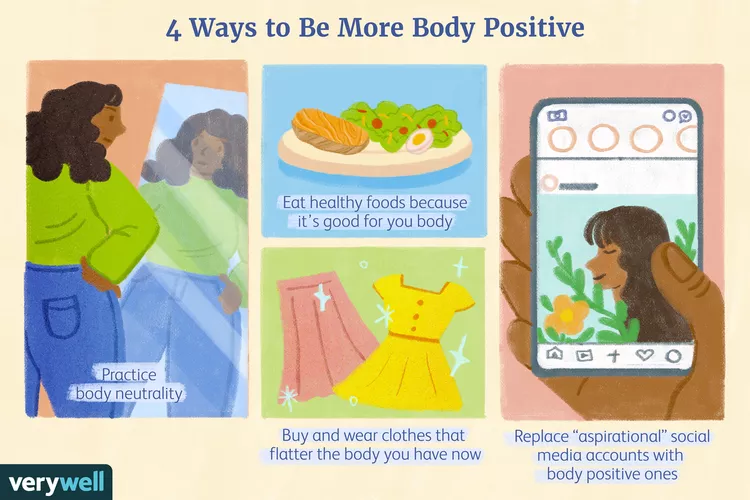The body positivity movement originated in the 1960s from the fat acceptance movement. Since then it has changed in many ways.
Featured Image by verywellmind
By: Alex Neal
Body positivity can mean many things and vary from person to person. According to verywellmind, it can be defined as:
- “Appreciating your body despite your perceived flaws”
- “Feeling confident about your body”
- “Loving your body”
- “Accepting your body’s shape and size”
Some goals of body positivity listed by verywellmind are:
- “Challenging how society views the body”
- “Promoting the love and acceptance of their bodies”
- “Addressing unrealistic body standards”
Psychology Today said, “Body positivity is a movement to accept bodies of all sizes and types, rather than those that conform to societal ideals of beauty. It empowers self-acceptance, inner worth, and appreciation for a body’s abilities.”

I agree that the body positivity movement is supposed to help empower people and help them feel better about themselves. I see it as a safe “place,” a community where everyone is accepted and can be themselves without the fear of being judged for who they are or who they love.
In an article by Psychology Today Alexis Conason – psychologist and eating disorder specialist – wrote an article on body positivity. While body positivity is supposed to be positive and helpful, she found something negative about it.
Conason wrote, “marginalized bodies are rarely centered. If you search the body positivity hashtags on social media, you will be met with swaths of thin white women who, though they may not be Twiggy-era thin and may be struggling with their own personal body image issues, are still occupying perfectly socially acceptable bodies”
The Cleveland Clinic said something similar by saying, “Some have pointed out that the movement often leaves people of color, people living with disabilities, and the LGBTQIA+ community out of the conversation.”
I agree and disagree with what Alexis Conason said. I agree that some people who struggle with their body image have bodies that are accepted by society but I think they should still be able to put body positivity hashtags. They still have their own struggles.
From what I’ve seen I haven’t seen people being left out of the body positivity movement but if it’s true then I think it needs to be worked on. The body positivity movement should be inclusive to everyone of all body types, sexualities, and ethnicities.
According to Science Direct, there is something called “toxic body positivity.” In an article they posted it said, “Much like the concept of toxic positivity, we suggest that pressure to be body positive urges women to feel positively about their bodies while stifling dissatisfaction – with the implication that one is at fault for failing to achieve body satisfaction.”
They believe that body positivity can backfire if it feels too controlling or forceful. I agree with this and I agree that “toxic body positivity” is real.
If people are forced to do something or feel some kind of way it could cause them to lose the progress they made. For me, when I feel like I’m being forced to do something I’ll shut down for a bit. When I’m making progress on personal issues and it feels like I’m being forced to improve too much at once I’ll go back to doing what I did before.

In an article by the Cleveland Clinic, they wrote, “Dr. Albers says positive thoughts can help your mood and rewire negative thoughts. Body positivity can also help dissolve thoughts that we might have picked up from childhood or society.” She added, “A ‘pro’ of body positivity is that it can help chip away at thoughts that come from diet culture – the one that makes us believe that our bodies are not worth living unless they are a particular shape or size.”
I agree that having positive thoughts can help rewire the way you think, but it will take time. Having a negative mindset for a long time can root those thoughts deep in someone’s brain. It’s not something that can be changed overnight. It will take time and patience with yourself.
Dr. Albers also said, “Telling people to love their bodies when they truly don’t can teach people to further suppress their feelings. Suppressing emotions is linked with higher levels of anxiety, depression, eating disorders and sometimes, in the extreme, suicide.”
This quote contradicts the words of an article published by verywellmind, it states, “Research suggests that having a positive body image is associated with a reduced risk of depression, higher self-esteem, and fewer dieting behaviors. Body image also plays a role in how people feel about their appearance and how they judge their self-worth.”
I agree with both statements made. I agree that it can cause someone to suppress their feelings, but I think it also causes us to acknowledge our feelings. We have to acknowledge how we feel if we want to improve.
I also agree that being body positive can cause someone to feel worse, but I also believe that it can help others feel better. It varies and depends on the person. No one will feel or react the same way since everyone is different.
Overall there’s no way of telling if body positivity is positive or negative. There are both pros and cons that can come from the movement. How it affects an individual is certain since everyone is different and unique. Some people see issues and others don’t. In the end everyone’s perspective is different and people will interpret things differently.
Tags: body positivity, clubs & lifestyles, rangers, Redwood, redwood gigantea, redwood high school, redwood journalism, redwood rangers, rhs, visalia ca

